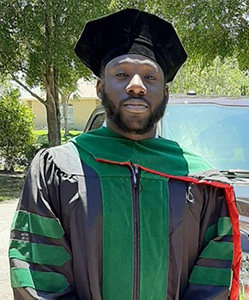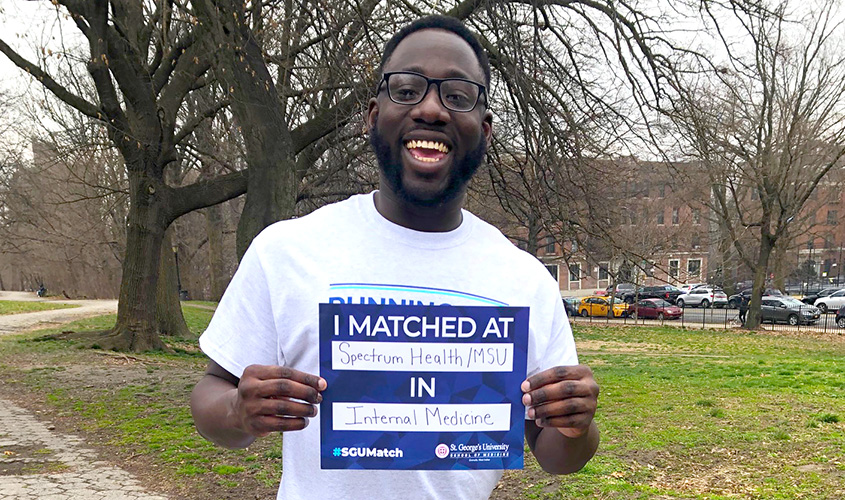Working in underserved communities “resonates with the soul”

Jeremiah Madedor, MD ’20
From up close, and from a young age, Jeremiah Madedor, MD ’20, has gained intimate knowledge of the disadvantages that stem from a lack of healthcare access. His mother, who immigrated to the United States from Nigeria, pushed him to volunteer at the local veterans affairs hospital and homeless shelter, and he also went on mission trips with the family’s church. Then as a medical student at St. George’s University, he got hands-on experience working with the homeless population in New York City, as well as those who struggled to make ends meet.
“Those things really resonate with the soul and need to be addressed,” said Dr. Madedor. “I feel that, as a physician, I can do that.”
Now a first-year internal medicine resident at Spectrum Health in Grand Rapids, MI, Dr. Madedor sat down with SGU News to discuss ongoing healthcare issues in underserved communities, as well as his experience entering medicine in an especially challenging time.
St. George’s University: What are the most significant problems facing healthcare in underserved communities?
Dr. Jeremiah Madedor: Means and access. Patients usually fall into those two categories. In terms of means, we’re talking about money, resources, insurance, and connections to get to a primary care provider or the medical help you need. For financial reasons, a lot of patients don’t see physicians. An emergency department visit can cost thousands of dollars even without surgery, and with surgery, you can be looking six or seven figures for the cost.
Access is just as bad as means, because people may have the money or insurance, but if they don’t have the time to go for care, then nothing will be done. Several patients I see in the clinic skip appointments because they don’t have a babysitter or they work long workdays, and the list could go on.
SGU: What was it like entering medicine in the thick of a coronavirus pandemic? How would you describe the hospital and the community in Grand Rapids?
Dr. Madedor: My hospital has been preparing for COVID spikes since March, and has handled it as well as you can. Residents are educated on cases with didactics, and MICU/pulmonary attendings have been instrumental in learning managements of COVID. During my clinic, I have been tasked with seeing COVID patients with virtual visits, and while on the intensive care unit I have been seeing patients firsthand and managing them with the guidance of pulmonary attendings. It’s definitely been a life-changing experience seeing the complications firsthand of this new disease.
SGU: How has the recent social justice movement energized or changed you personally and/or professionally?
Dr. Madedor: I don’t believe it has energized or changed me personally because I have always fought for those disenfranchised or less fortunate. As an African American, I live this fight every day, so with my patients, I can empathize with them. I relate to them on a personal and ethnic level. A lot of people say ‘hi’ to me on the hospital floors or in the clinic and are happy to have their skin color represented by the physician they see.
“SGU took a student who was a potential diamond in the mine and refined him.”
SGU: Is there a case or experience that you can point to that brought your career path into focus?
Dr. Madedor: When I worked at Brooklyn Hospital as a medical student, there are incidents I can always lean on that fueled my fire. Working with Dr. Mansur and Dr. Bakshi is something I will always cherish. They taught me not see a patient as a pit stop but, as a physician, you become their conduit who will guide them to their next destination. So with that in mind, I did my best to learn their cases better and do thorough chart reviews so I could prevent potential oversights. Then in the rooms, I treated them like human beings, because patients are more than stats, and sometimes we forget that with a busy schedule.
SGU: How would you describe your experience at SGU, and how has it prepared you for your career?
Dr. Madedor: SGU was one of the most challenging and exhausting journeys of my life. I wouldn’t change that for the world because it prepared for me the roadblocks ahead. Now, as I sit here in the ICU, we had two patients code, two admissions, and I had to follow up on multiple patients throughout the night. Without the tools and guidance I received at SGU, I don’t think I would be capable of this feat. SGU took a student who was a potential diamond in the mine and refined him. Now he is a resident living out his dreams amongst the elite in his craft. From the days of eight- to 10-hour study dates, student support sessions, and rounding as a medical student, SGU provided the necessary environment for me to grow. With great resources, teaching, and great hospitals to rotate at, my experience couldn’t have been any better.
– Brett Mauser

On Match Day 2020, Dr. Madedor shared the news that he was headed to Grand Rapids, MI, for an internal medicine residency with Spectrum Health.

